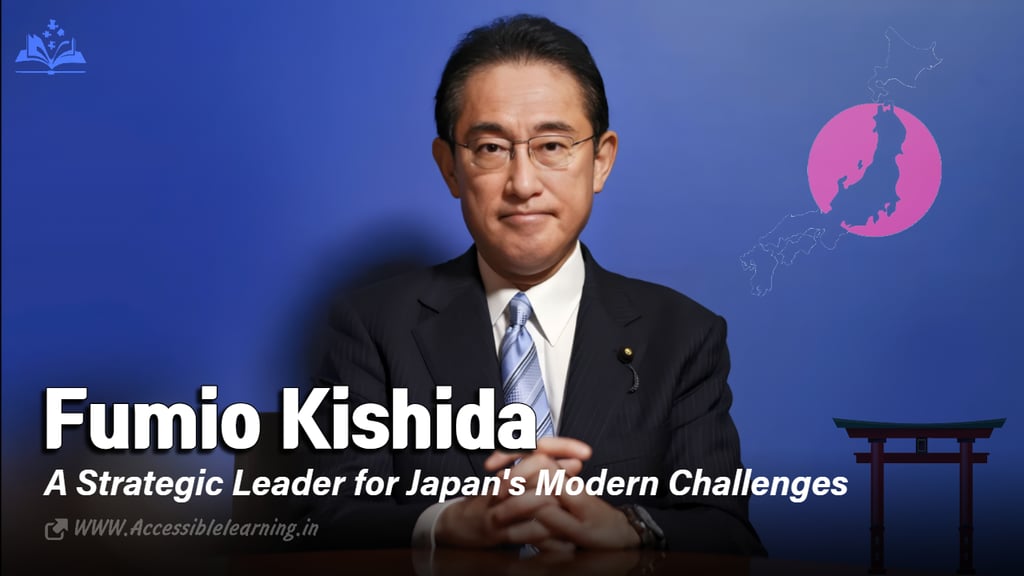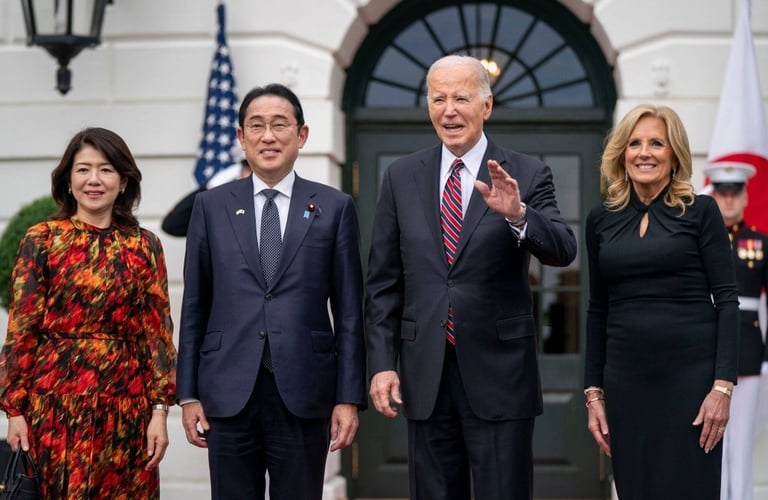
Fumio Kishida: Japan's Progressive Conservative Leader Who Shaped a Nation in Transition
Fumio Kishida: The Quiet Architect of Japan's Strategic Reset How a diplomatic statesman from Hiroshima navigated Japan through global uncertainty with pragmatic vision, personal conviction, and strategic foresight to reshape the nation's economic, security, and diplomatic foundations.
JAPANBIOGRAPHYTHE GREAT LEADERPOLITICAL JOURNEY
Kim Shin
4/12/20256 min read


In the complex landscape of Japanese politics, few figures have navigated the challenging terrain with the diplomatic finesse and pragmatic vision of Fumio Kishida. As Japan's Prime Minister from October 2021 to July 2024, Kishida's leadership came during a pivotal period of global uncertainty, regional tensions, and domestic challenges that tested both his resolve and political acumen.
Early Life and Political Foundations
Born in Tokyo on July 29, 1957, Kishida's political journey was influenced by his family background. He grew up in a political household - his father and grandfather both served in the House of Representatives. After graduating from Waseda University with a law degree, Kishida briefly worked in banking before following his family's footsteps into politics.
What many don't know is that Kishida spent formative years in New York City during elementary school while his father worked there. This early international exposure gave him an unusually global perspective, rare among Japanese politicians of his generation, and contributed to his English language proficiency. His childhood experiences in America would later inform his nuanced approach to Japan-U.S. relations.
His political career began in earnest in 1993 when he won his first election to the House of Representatives, representing Hiroshima's first district. This connection to Hiroshima would profoundly shape his worldview and policy positions, particularly regarding nuclear disarmament and peace initiatives.
The Diplomatic Statesman
Kishida's tenure as Japan's Foreign Minister from 2012 to 2017 under Prime Minister Shinzo Abe revealed his diplomatic prowess. During this period, he orchestrated several significant diplomatic achievements:
Facilitating President Barack Obama's historic visit to Hiroshima in 2016
Negotiating the landmark agreement with South Korea regarding the comfort women issue
Strengthening Japan's strategic partnerships across the Indo-Pacific region
Advancing the concept of a "Free and Open Indo-Pacific" strategy
His measured approach to diplomacy earned him respect both domestically and internationally. Unlike some of his more hawkish colleagues, Kishida maintained a moderate stance while still advancing Japan's strategic interests.
What distinguished Kishida's diplomatic approach was his record-breaking travel schedule—he visited over 50 countries as Foreign Minister, more than any predecessor in the same timeframe. This extensive diplomatic outreach earned him the nickname "The Flying Minister" among the Japanese diplomatic corps.
Rise to Prime Minister
After Yoshihide Suga's unexpected resignation in 2021, Kishida emerged victorious in the Liberal Democratic Party's leadership contest, defeating more prominent candidates through strategic coalition-building and by positioning himself as a consensus candidate who could bridge various factions.
Interestingly, Kishida had unsuccessfully challenged for party leadership twice before, losing to both Shinzo Abe and Yoshihide Suga. His persistence and strategic patience—rare qualities in the often cutthroat world of Japanese politics—ultimately paid off. Political analysts noted his ability to learn from each defeat, adjusting his platform and coalition-building strategy with each attempt.
Upon becoming Prime Minister in October 2021, Kishida inherited a nation facing multiple challenges:
The ongoing COVID-19 pandemic and its economic aftershocks
Rising tensions with China over territorial disputes and regional influence
The need to revitalize Japan's stagnant economy
Growing security concerns regarding North Korea and regional stability
Kishida's "New Capitalism"
Central to Kishida's domestic agenda was his vision of a "new form of capitalism" that aimed to address growing economic inequality while maintaining Japan's competitive edge. This economic philosophy sought to
Increase wages for middle-class workers
Expand the social safety net while maintaining fiscal discipline
Invest in human capital and next-generation technologies
Reduce the economic disparities that had grown during decades of economic stagnation
While his economic policies faced criticism from both market liberals wanting more deregulation and progressives seeking more robust redistribution, Kishida maintained that his middle path represented a sustainable approach to economic rejuvenation.
What made Kishida's economic vision distinctive was his direct challenge to the "trickle-down" economics that had dominated Japanese policy since the 1980s. As a former banker, his critique of financial capitalism carried unusual weight, surprising many economists who had expected a more traditional conservative approach.


Security Policy Transformation
Perhaps Kishida's most consequential legacy was his response to the changing security environment in East Asia. Following Russia's invasion of Ukraine and China's increasingly assertive posture, Kishida implemented Japan's most significant security policy shifts since World War II:
Doubling defense spending to reach 2% of GDP by 2027
Acquiring counterstrike capabilities, marking a significant departure from Japan's traditionally defensive posture
Strengthening security partnerships with the United States, Australia, India, and European nations
Expanding Japan's security role in the Indo-Pacific region while maintaining its constitutional constraints
These decisions represented a delicate balancing act between addressing emerging threats and maintaining Japan's pacifist traditions, reflecting Kishida's pragmatic approach to national security.
Behind these policy shifts was Kishida's less-publicized program to modernize Japan's intelligence capabilities. He quietly established Japan's first comprehensive intelligence analysis center, integrating diplomatic, military, and economic intelligence—a significant evolution for a country historically limited in its intelligence operations.
Nuclear Disarmament Advocate
Despite his security policy reforms, Kishida remained deeply committed to nuclear disarmament. As the representative from Hiroshima, he consistently advocated for a world free of nuclear weapons.
Hosting the G7 Summit in Hiroshima in 2023, bringing world leaders to the site of the atomic bombing
Establishing the Hiroshima Action Plan for nuclear disarmament
Maintaining dialogue with nuclear powers while advocating for gradual disarmament
Balancing Japan's reliance on the US nuclear umbrella with his disarmament ideals
This commitment reflected Kishida's unique position as both a security realist and a disarmament idealist, informed by his personal connection to Hiroshima's tragic history.
Few know that Kishida's grandmother was a hibakusha (atomic bomb survivor), giving him a deeply personal connection to nuclear disarmament beyond political positioning. He often carried his grandmother's charred wristwatch to international meetings as a personal reminder of nuclear weapons' human cost.
Cultural Impact and Personal Life
Unlike many Japanese politicians who maintain a strictly formal public persona, Kishida occasionally revealed glimpses of his personal interests that resonated with younger Japanese citizens. An avid baseball fan, he played the sport throughout his youth and maintained ties to local teams. More surprisingly to many Japanese, he developed a reputation as an impressive amateur bartender, specializing in cocktail mixing—a hobby he maintained even while in office.
His literary interests also informed his political philosophy. Kishida frequently cited Albert Camus' works, particularly "The Plague," as influential on his worldview. During the COVID-19 pandemic, he referenced the novel's themes of solidarity in crisis when discussing national response efforts.
Digital Transformation Initiatives
A lesser-known aspect of Kishida's premiership was his ambitious digital transformation agenda. Recognizing Japan's lagging digital infrastructure compared to other developed nations, he established the Digital Agency in 2021 and implemented sweeping reforms:
Modernizing Japan's bureaucratic paper-based administrative systems
Introducing the digital national ID system (My Number)
Investing in quantum computing and AI research centers
Establishing regulatory sandboxes for fintech innovation
These initiatives aimed to address what he called Japan's "digital defeat"—the country's surprising technological conservatism despite its reputation for innovation. His goal was positioning Japan to compete effectively in the digital economy while addressing privacy concerns that had previously slowed digital adoption.
Diplomatic Challenges
During his premiership, Kishida navigated complex diplomatic waters:
Managing the U.S.-Japan alliance through changing administrations
Addressing historical tensions with South Korea while building strategic cooperation
Responding to China's growing assertiveness while maintaining economic ties
Coordinating Japan's position on the Ukraine conflict
Engaging with developing nations to counterbalance China's influence
His diplomatic approach emphasized multilateralism and rules-based international order, positioning Japan as a key stabilizing force in an increasingly volatile region.
A diplomatic breakthrough that received limited international attention was Kishida's successful negotiation of enhanced intelligence-sharing arrangements with both South Korea and Australia, creating a trilateral security information framework that significantly strengthened regional security coordination without the formal alliance structures that would have triggered stronger Chinese opposition.

Climate Leadership
Environmental policy became an unexpected focus area for Kishida, who accelerated Japan's climate commitments beyond what analysts had predicted. His administration:
Pledged carbon neutrality by 2050 with concrete implementation plans
Quadrupled investment in hydrogen energy infrastructure
Established Japan's first comprehensive climate adaptation funding mechanism
Launched the "Asia Zero Emission Community" initiative with neighboring countries
What distinguished his approach was balancing environmental goals with economic opportunities, particularly by positioning Japanese green technology companies to lead emerging markets in environmental solutions across Asia.
Legacy and Impact
Kishida's leadership tenure, while not marked by charismatic flourishes or dramatic policy reversals, represented an important transitional period for Japan. His legacy includes
Setting Japan on a new security trajectory that future administrations will build upon
Establishing a more balanced economic model that addresses inequality alongside growth
Rebuilding diplomatic bridges that had frayed under previous administrations
Maintaining political stability during a period of global turbulence
Reinforcing Japan's commitment to international cooperation and rules-based order
When he stepped down in July 2024, Kishida left a Japan that had subtly but meaningfully evolved in its approach to security, economics, and international relations.
Political historians note that Kishida achieved something rare among modern Japanese prime ministers—completing major policy initiatives across security, economy, and diplomacy while maintaining relatively stable approval ratings and avoiding the scandals that frequently end Japanese premierships prematurely.
Fumio Kishida embodies the complexity of modern Japanese leadership - balancing tradition with adaptation, security with peace advocacy, and economic growth with social cohesion. While not the transformative leader that his predecessor Shinzo Abe aspired to be, Kishida's steady hand during a period of global uncertainty helped position Japan for the challenges of the mid-21st century.
As historians evaluate his impact, they will likely note that beneath his unassuming demeanor lay a leader who navigated Japan through significant transitions with pragmatism, principle, and a clear understanding of Japan's evolving role in an unstable world. In this sense, Kishida may be remembered not for dramatic reforms but for careful stewardship during a pivotal period in Japan's modern history.
Subscribe To Our Newsletter
All © Copyright reserved by Accessible-Learning Hub
| Terms & Conditions
Knowledge is power. Learn with Us. 📚


